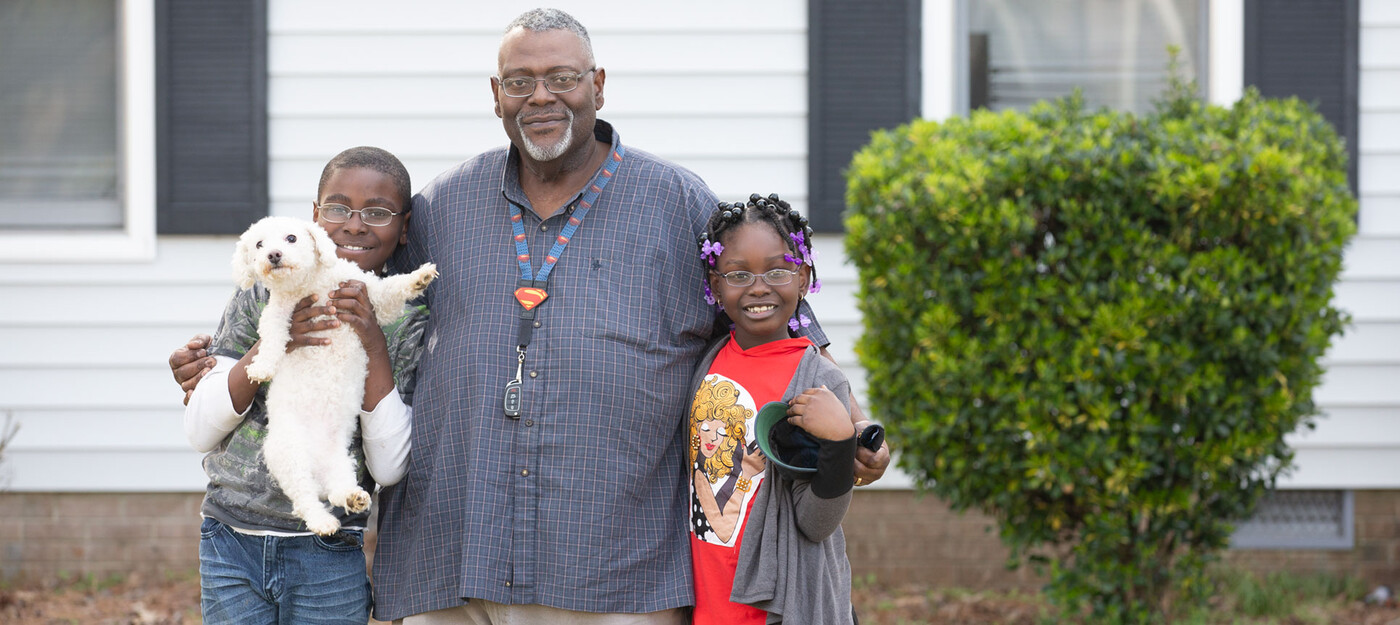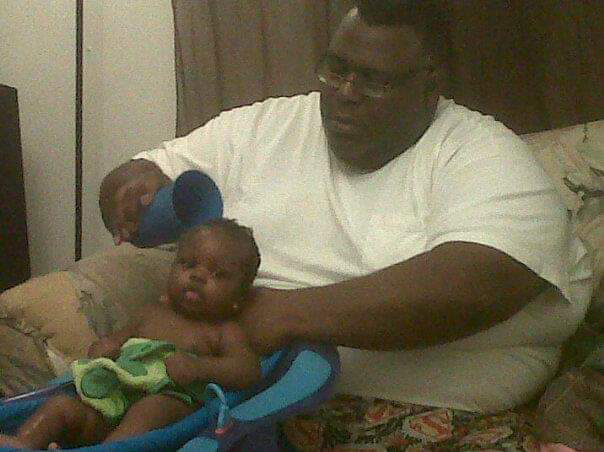 From the DukeHealth.org archives. Content may be out of date.
From the DukeHealth.org archives. Content may be out of date.
Weight Loss Surgery Gives Former Football Player His Life Back

One year after a duodenal switch, Ronald Utley enjoys playing outside with his children, Joaquin and Jenesis. (Photo: March 2019)
Ronald Utley of Wendell weighed 635 pounds and was suffering from leg ulcers, gout, and other serious health issues when he decided it was time to consider bariatric surgery. Nearly one year after undergoing a duodenal switch at Duke, he’s down to 389 and feeling good about his journey toward his goal weight.
“Do whatever you can to get to surgery, because you will be a new person,” Utley advised anyone struggling with obesity and considering bariatric surgery. The 54-year-old father of six said, “To get out there with my kids and throw a football, throw a Frisbee, walk the dog, those are things I couldn’t do with them before. To get that all back is a real joyous feeling.”
Young Athletic Lifestyle Leads to Midlife Weight Gain
As a young man, Utley ate a lot to offset the energy he was burning as a high school, college, and semi-pro football player.
“We had to take in plenty of protein and carbs to keep our strength up,” Utley said. He remained active and kept that diet even after his football days without problems. That changed after he went through an extended recovery following a serious car accident.
“The weight just gradually built up over time,” said Utley.
The more weight Utley gained over the years that followed, the more problems he encountered. He experienced gout and inflammation. He developed skin ulcers on his legs. He became uncomfortable in social situations so he avoided them. He worried about fitting in chairs that would hold his weight in public settings. He started to use a walker. Eventually, he had to stop working.
One of the worst consequences was that he could no longer play with his kids. He felt like a prisoner in his own body. Developing blood clots was the last straw. He viewed it as a wakeup call.
“That let me know that I needed to do something,” he said.

Weight Loss Surgery Isn’t a Quick Fix; It’s a Start
Utley had tried dieting, but the weight always came back. He thought weight loss surgery might be a quick fix. He started researching his options.
“I went to meetings at three different hospitals before I chose Duke,” he said.
He learned how serious his health condition was at his first medical evaluation. He met with a team of specialists that included a cardiologist, a psychologist, a pulmonologist, and surgeons. He was told he needed to lose weight before they would consider surgery to be a safe option. He worked with a Duke nutritionist who helped him lose 90 pounds.
In April of 2018, Utley underwent a duodenal switch. It’s one of the more complex bariatric surgeries, but his weight loss surgeon, Daniel Guerron, MD, recommended it because it can be very effective in people whose body mass index is greater than 50-55. And, it results in more weight loss and is more effective at controlling obesity-related conditions -- like diabetes -- than other weight loss procedures.
Learning New Habits, New Way of Life
After the procedure, Utley quickly realized “it’s not the easy way out.” He had trouble, at first, cutting back on his food intake because he was so used to eating large quantities. Attending monthly support meetings led by Duke’s team of nutritionists, psychologists, and physician assistants taught him how to change his eating habits, incorporate exercise, and manage the stress that could lead to overeating.
“They teach you how to do it,” he said. “They’re great with support. The nurses, doctors, everyone there wants to see you get better.”
As the pounds came off, his health improved. He no longer suffers from blood clots, leg ulcers, and gout. He’s more active, working out on a treadmill and lifting weights at a gym several times a week. He’s social again, happy to see the friends and family he hasn’t seen in a long time.
Best of all, he can play football and enjoy spending time being active with his kids.
“I love it,” he said. “I feel like I was before I started gaining weight.”


